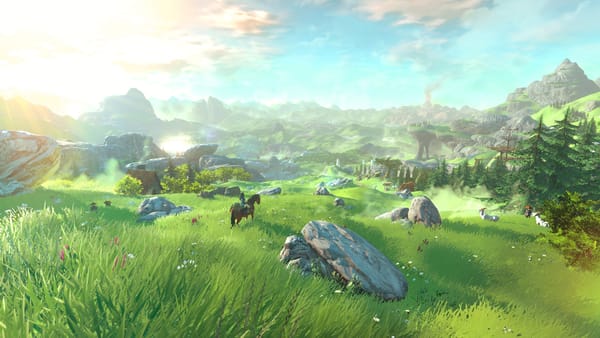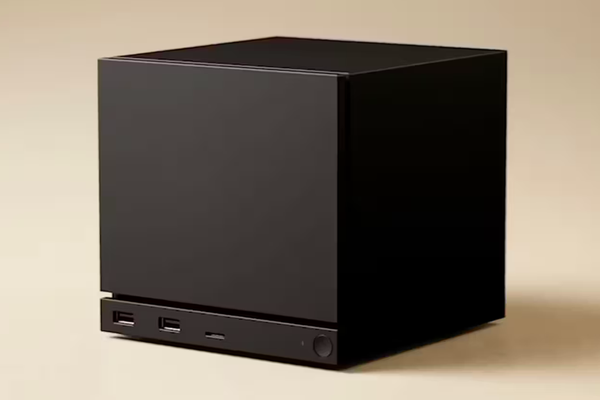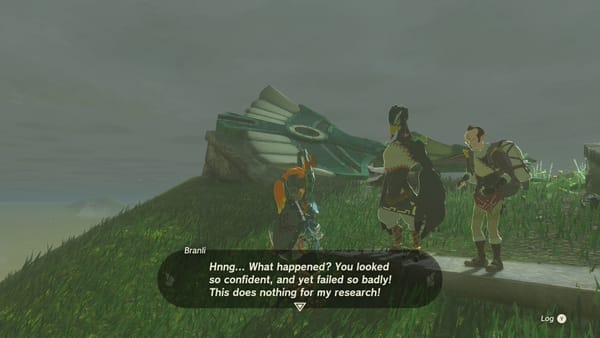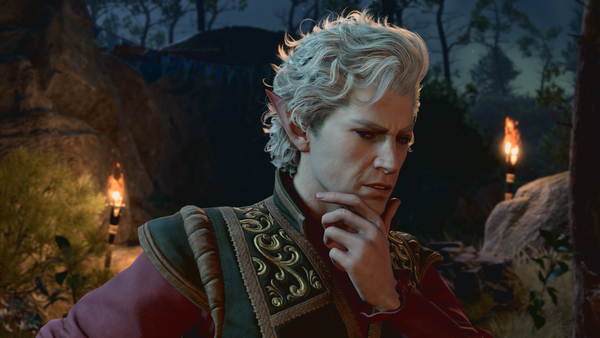#161: Silence kid
On the triple-A scene's troubling disdain for the value of a little peace and quiet. Also: Black Friday!
Hello! Gosh, please forgive my lengthy absence. My wife and the eldest tested positive for Covid, then I felt rough while doing the whole single-dad-and-fulltime-nurse thing but kept testing negative, then I tested positive and that was that.
I haven’t struggled too badly with it, to be honest; symptoms-wise it’s just been a heavy cold. But I feel empty. As if I have been simply unplugged. I’m still testing positive as of this writing, but yesterday’s headache is gone, the general fug has started to clear, and I am bored out of my bloody mind. I figured I might try and put fingers to keys for a while.
When I finally tested positive, I felt a certain relief; at least I could stop worrying about it now. Besides, a week at home, forced off the school runs and the dog walks, sat on my backside? Think of all the videogames I could catch up on! Things are never quite so simple, of course, and I’ve found myself able to play very little of anything. Ragnarok was naturally top of the list, but despite playing it on one of the lower difficulty settings — one rung up from the bottom; these days I treat a videogame difficulty menu like the wine list at a fancy restaurant — I found it quite overwhelming, even in its supposedly quieter moments.
I just couldn’t play it, and began to wonder why. Its resplendent HDR treatment was partially to blame, I reckoned, its searing luminescence stabbing into my eyes, poking my already strained sinuses with a big snowy stick. Perhaps the zoomed-in closeness of its camera was making me claustrophobic. Maybe it was combat, which I am yet to get into the rhythm of; it makes me feel like the biggest threat is always out of shot, and I’m never quite sure what I should be focusing on amid the onslaught of offscreen warning arrows, variously hued attack indicators and urgent ally barks. Perhaps my Covid-addled brain just couldn’t handle the load.
All those things, I am sure, played their part. But none quite explains why I felt so constantly overwhelmed by the game, even when nothing was happening. I dwelt on it some more. Then I read this Axios interview with Ragnarok’s narrative director, Matt Sophos, and I felt everything fall into place. As Axios’ Stephen Totilo explains:
“Though much of the sequel’s story is offered through a traditional mix of cinematic scenes, quests and menu text, the developers greatly expanded a system introduced in the series’ 2018 release, which triggered extra conversation between Kratos and Atreus that would play during travel sequences. The new game has been programmed to detect a player’s pace and anticipate more potential down moments, often just 20 seconds long, when combat or a major plot moment isn’t expected. Those spots afford a chance for more chatter among whichever characters are running around.”
Ragnarok’s narrative team, Totilo says, have “buckets” filled with dialogue exchanges of certain lengths, and have coded the game to dynamically slot one in when it notices that nothing is happening, and calculates that nothing else is going to happen over the next 30 seconds or whatever. This is a pretty cool bit of technology, I must admit. But also — and forgive my bluntness here; perhaps we can blame Covid — it is a terrible idea and I hate it.
I am English, and so naturally crave peace and quiet. I am also a father of two, so naturally said craving is rarely satisfied. Even when all is well, the thing I want most in the world is to be left alone, so the last thing I need is for games to start muscling in and filling my precious free time with noise where no such noise is required, or desired. When I am ill, as my recent exertions have proved, my brain simply will not allow it.
I have fond memories of playing the first few Assassin’s Creed games while signed off with some ailment or other, their peaceful sprawl offering pleasant sedation, their historical tourism a welcome escape. Yes, at their core these games are about stabbing people in the neck. But I could take them at my own pace, pottering around rooftops after collectibles, clearing out map icons at a stroll. Climbing Renaissance landmarks with the music dropping away, the wind whistling around me, my palms sweating from more than just the fever as I clambered towards the summit? Magic. Man, maybe I should just stop writing this now and go and play Brotherhood. It’s been far too long, and what a banger.
Peace. Quiet. Respite. These are ultimately questions of pacing; easy enough to manage for yourself in a vast open world filled with distractions, but in a game with a linear story it is all down to the developers, and I am hugely appreciative of the ones that acknowledge the player’s need to decompress. The refrain that plays in the Resident Evil 4 save screen, for instance, is simply burned into my soul, so often have I heard it, so long have I let it play. It represents a brief sanctuary from all the shuffling things that want to kill you with their grasping hands and sudden lunges, their throwing axes and chainsaws and neck-hole tentacles. The development team chose that music, with its warmly calming beauty, for a very specific reason. It knew what players would need from the game’s save screen: a timeout in the middle of a warzone, a health spa in the thick of the apocalypse.
Another! When you finish the first level of Silent Hill: Shattered Memories, the game cuts from a breathless, panicked escape to a therapist’s office. It presents you with a black-and-white drawing and asks you to colour it in. I spent half an hour on it and it was perfect by the end, or at least as perfect as the Wii Remote would allow. Peace. Quiet. Contemplation and recovery. Take a few breaths, allow the pulse to settle, and move on refreshed.
Then, of course, there is Destiny. (In Hit Points, there is always Destiny.) One of the most insightful things I have ever read about the game was published about a week after it came out in the autumn of 2014. Tom Bramwell, then editor of Eurogamer and these days a consulting colleague, paid-up Hit Points pal and increasingly dear friend — seriously he popped up on Discord two minutes ago to ask how I was feeling, hi Tom, love you — wrote in praise of Destiny’s quieter moments. Over to you, squire:
“As in Halo, even the most insignificant firefight has its own exquisite grammar and cadence, each melodic rush of an emptied clip and a rifle-butt combo punctuated by a brief retreat to reload and recharge your shields. Those pockets of downtime are crucial to the game's character. Zoom out a bit more and you have that brilliantly judged lull at the end of each mission, the countdown in the top-left of the screen as you wait to be transported back into orbit. It's not quite enough time to do anything productive with your character, but it's just enough to draw breath and let your mind wander. I like to think they spent ages working out how long to keep you there. The solution was as elegant as it is effective: after a final 30 seconds of fun, here's 30 seconds of quiet reflection.”
As I say, about a week after the game came out. Infuriating. I take back all that stuff I said earlier, what a prick.
My point here is that these things matter — that silence gives context and texture to high-volume action — but Ragnarok either doesn’t realise this, or simply doesn’t care. In that Axios interview, narrative designer Sophos refutes the widely held assumption that the bits where Kratos and Atreus shimmy through a small crevice in a rock face are necessary to mask loading times, ensuring the game’s one-shot conceit remains unbroken. Not so, he says: it’s about story, man, about Kratos and Atreus and their journey. “A lot of times it's like, ‘Hey, we've just had a bunch of combat, and we need space to have them reflect on it.'”
Them? What about me? When do I get to reflect, to decompress, to calm down? When do I get two minutes to myself? Never, because there are buckets full of this chatter stacked up in the game code, and the harder I try to find peace — the further I deviate from the beaten path, the more I dawdle along the way — the more story the game will deploy to fill the silence.
I feel like I am writing this a lot lately, but let me make clear again that I am not ragging on Ragnarok specifically. I was really looking forward to playing it on my sickbed! I am greatly appreciative of the peek behind the curtain that Sophos has given us, revealing how these games work their technical magic. Ragnarok is merely the latest addition to the modern wave of overly chatty, unnecessarily helpful triple-A games. Hit Points tries to zoom out from the events of the day to get a sense of the wider shape of things, and in this sense Ragnarok is but a handy springboard into the late autumnal sky. How striking that we began 2022 talking about how Elden Ring runs counter to user-experience best practice, and are ending it discussing a game that, for all its evident qualities, shows the perils of following the handbook to the letter.
Sure, I understand that the desire here is to reduce big-budget titles’ reliance on traditional videogame storytelling techniques: cutscenes, slow-walk conversations, audiologs, lore collectibles, all that. Finding ways to seed narrative to the player when they are doing other things, or doing nothing at all, is on the face of it a pretty elegant solution. But is this actually better? I’m not convinced.
It seems to me to be solving a problem for developers — where do we put all this story we wrote? — by creating one for the player, by forcing them to always be listening to something. When a developer is prioritising the protagonist’s need to decompress after a big battle ahead of the player’s, I think perhaps the dials have been turned a little too far. I am perfectly capable of doing my own colouring in, if you don’t mind! All I need is five minutes to myself.
***INTERMISSION***
As you may have heard, it is Black Friday week. (My thoughts are with the talented website writers who are spending this week chained to office radiators, writing up deals posts.) What’s that? Hit Points should do a deal of some kind, you say? Even though it actually lowered its subscription fees a few months ago in recognition of the rising cost of living? Oh, fine, why not.
For the next seven days you can get 10% off an annual subscription to Hit Points. A paid sub unlocks at least one additional post per week and grants access to the full Hit Points archive, including the longform interview series Max HP. Looking ahead a bit, paid subs will get the lion’s share of Hit Points’ end-of-year celebrations — and will even be invited to take part in them. More news on that in Friday’s subscriber-exclusive post.
A few months ago I set myself some modest targets for growth, with the first deadline being the end of 2022. We sailed past the free-subscriber target weeks ago (hurrah!) but I still need a few more paid subs to hit my goal. Do a sick old man a favour, would you? I promise it’s worth the money, and I reckon the hundreds of members of the fully fledged Hit Points Crew would tell you the same.
MORE!
- The latest from Onoma, the studio formerly known as Square Enix Montreal that is being shuttered by new parent Embracer: it is ending service for four of its highly regarded smartphone games, all of which will be rendered unplayable as a result. This would be sorry stuff at the best of times; factor in all the noise Embracer makes about its physical game archive and, well. “We believe that games carry a heritage worth celebrating and safeguarding for the future,” says the blurb about it on Embracer’s website. “Our goal is clear — we want to archive and save as much of the videogame industry as possible.” Fuck about.
- Elsewhere, Embracer has put Saints Row developer Volition under the control of Gearbox after admitting the recent reboot was not up to snuff (please insert your own Gearbox joke here, though if you ask me the Colonial Marines gags are rather played out by this point). Embracer has also embarked upon a full assessment of its operations, warning investors that the “macroeconomic reality” may compel it to spin off subsidiaries into standalone, publicly traded companies in future.
- The UK’s Competition and Markets Authority, the antitrust regulator that poses an existential threat to Acquisition Blizzard, has announced an investigation into cloud gaming services and browsers on Apple and Google’s app stores. Could this pave the way for a native Game Pass app on the mobile download stores? Crivens. We now go live to Phil Spencer for his reaction.
- Speaking of which, Sony has expressed its confidence that the CMA will block Acquisition Blizzard. In a statement the PlayStation maker has warned that, if the deal goes through, Microsoft would be free to “increase console and game prices.” Ha, yes, wouldn’t that be disastrous. Let’s hope that never happe- oh. Ah.
- The head of an electric-vehicle joint venture between Sony and Honda has been talking up the potential of videogames in cars, citing Sony’s “content, services and entertainment technologies” as a key competitive advantage over Tesla. Sony Honda Mobility president Izumi Kawanishi said it was “technologically possible” to integrate the PS5 into a car and, look, of course it is. It’s also technologically possible for me to do a loft conversion by myself but that doesn’t make it a good idea, does it, even if I would dearly like a walk-in wardrobe, an en-suite bathroom, and a little more physical distance from the kids.
- Epic Games has accused Google of paying Activision Blizzard $360m to shelve plans for its own mobile app store. Activision says it has already disproven the allegation, which was made in a newly unredacted filing from the lawsuit Epic filed against Google in 2020.
- Three cheers for Ireland’s new games tax credits. Developers will be able to claim back almost a third of their spend on design, production and testing, to a maximum of €25m per project.
Gosh, I need a lie down now. But it’s nice to have actually done something with my brain for the first time in almost two weeks. All being well I’ll be back in paid subscribers’ inboxes on Friday. Have a grand couple of days — and to US pals, a very happy Thanksgiving. Cheerio!
(And yes, that’s a Pavement reference in the headline. Hit Points will do that every so often. If you spotted it, we are friends forever.)





